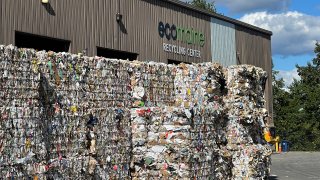
- China was buying most U.S. recyclables, but in 2018 it banned their import.
- That made it a lot more expensive for municipalities to continue recycling programs.
- Maine's proposed law will force companies that produce garbage from packaging to fund its recycling by paying into a fund that reimburses municipalities.
A new state law in Maine will make producers of packaged goods pay to recycle them, and it could set the standard for the rest of the nation.
The law is particularly urgent now, because the cost of recycling is going up, and local municipalities are getting crushed.
Get Tri-state area news delivered to your inbox.> Sign up for NBC New York's News Headlines newsletter.
Some have stopped recycling programs altogether, while others have severely curtailed them, all at a time when climate awareness and action have never been higher.
The law, sponsored by state Rep. Nicole Grohoski, will force companies that produce garbage from packaging to fund its recycling by paying into a fund that reimburses municipalities. The formal term for it is extended producer responsibility.
"The first priority of the bill is to right now take what is a taxpayer burden and shift that back onto the producers of the waste," Grohoski said in an interview with Portland's NBC affiliate WCSH. "We know that they [communities in Maine] want to offer recycling, but they don't have the money to do it, so this would create a revenue stream to create proper recycling programs for everyone in Maine."
Money Report
China was buying most U.S. recyclables, but in 2018 it banned import of several recyclable materials. That resulted in a 50% drop in the revenues received from the sale of recyclables recovered through curbside pickup, and an annual loss of about $400 million in revenue to the local municipalities that do the recycling, according to the Solid Waste Association of North America's Applied Research Foundation.
"Our municipalities, all of a sudden were faced with this cost that they didn't anticipate, and it really forced them to either abandon or cut back on their recycling programs or raise taxes to keep them going," said Sarah Nichols, Sustainable Maine program director at the National Resources Council of Maine.
In addition to funding recycling, Nichols hopes the bill will create economic incentives for producers to create less packaging, to offer more reusable packaging options, and to make what packaging that remains recyclable.
The law applies to nearly all producers big and small, from Amazon to Maine businesses, with a few exceptions for very small businesses. While it may sound simple, some of the largest sellers of packaged goods, Maine's grocers, warn that it is not.
"The unknowns of implementation are the biggest concerns," said Christine Cummings, executive director of the Maine Grocers & Food Producers Association. "There is a lot of extra administrative work for the brand owners to determine what type of packaging materials they use, what is the weight of those materials, and then ultimately what is sold back into the Maine market in which they'll be paying upon."
The law could take years to begin
Although the law has been passed, the state has to set rules around the law, which means it may not go into full effect until 2027.
For instance, it could take years to determine which materials producers have to pay for and which brands are covered. National brands are clearly covered, but if a store has its own label on a spice, and the spice is produced by another distributor, it's unclear who pays. It's also not yet known how much all of these added costs will trickle down to retailers regardless of whether they have to pay into the fund.
"The retailers are concerned in general about overall inflation rates and price hikes and what that means for the overall cost of goods and what folks are bringing home in their shopping carts," Cummings said.
Extended producer responsibility could increase the consumer's cost of products by up to $134 million a year, or as much $60 for a family of four, according to a study from Toronto's York University.
But some big multinational companies are already on board. More than 150, including Coca Cola, Unilever and Walmart, recently signed a pledge saying that in order to solve the "packaging waste and pollution crisis," there must be mandatory programs, "in which all industry players introducing packaging to the market provide funding dedicated to collecting and processing their packaging after its use."
Japan, South Korea, most of the European Union and parts of Canada have been using extended producer responsibility for recycling for several years, with no price increases for consumers. The state of Oregon passed a similar bill this summer.
"We're the first domino to fall in the United States, but we're really following along in the footsteps of other countries across the world," said Nichols.
Correction: This story has been updated to reflect the businesses covered by the law, and to reflect that a similar law in Oregon has passed.






